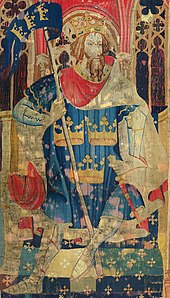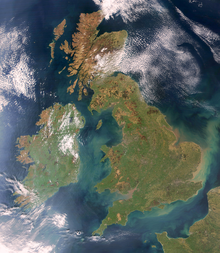
Back Nacionalisme britànic Catalan Cenedlaetholdeb Prydeinig CY Nacionalismo británico Spanish ملیگرایی بریتانیایی FA Nationalisme britannique French イギリスのナショナリズム Japanese Британский национализм Russian Nacionalizmi britanik SQ 英国民族主义 Chinese




British nationalism asserts that the British are a nation and promotes the cultural unity of Britons,[1][2] in a definition of Britishness that may include people of English, Scottish, Welsh, and Irish descent (those living in both Northern Ireland and Great Britain and historically the whole of Ireland when it was within the United Kingdom).[3] British nationalism is closely associated with British unionism, which seeks to uphold the political union that is the United Kingdom, or strengthen the links between the countries of the United Kingdom.[4]
British nationalism's unifying identity descends from the ancient Britons who dwelt on the island of Great Britain.[2] British nationalism grew to include people outside Great Britain, in Ireland, because of the 1542 Crown of Ireland Act, which declared that the crown of Ireland was to be held by the ruling monarch of England as well as Anglo-Irish calls for unity with Britain.[5]
It is characterised as a "powerful but ambivalent force in British politics".[6] In its moderate form, British nationalism has been a civic nationalism, emphasizing both cohesion and diversity of the people of the United Kingdom, its dependencies, and its former colonies.[7] However, nativist nationalism has arisen based on fears relating to immigration; this anti-immigrant nativist nationalism has manifested politically in the British National Party and other nativist nationalist movements.[7] Politicians, such as former British prime minister David Cameron, have sought to promote British nationalism as a progressive cause.[8]
- ^ Motyl 2001, pp. 62–63.
- ^ a b Guntram H. Herb, David H. Kaplan. Nations and Nationalism: A Global Historical Overview: A Global Historical Overview. Santa Barbara, California, USA: ABC-CLIO, 2008.
- ^ Motyl 2001, pp. 62–64.
- ^ Miller 2005, p. 133.
- ^ Brendan Bradshaw, Peter Roberts. British Consciousness and Identity: The Making of Britain, 1533-1707. P. 302.
- ^ Smith, Smith & White 1988, p. 61.
- ^ a b Motyl 2001, pp. 64.
- ^ Conservative Party leader David Cameron advocates liberal or civic British nationalism: "Cameron: I will never take Scotland for granted". Conservatives. 15 September 2006. Archived from the original on 24 September 2012.
Being British is one of the most successful examples of inclusive civic nationalism in the world.
The official party site.